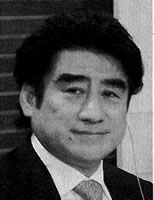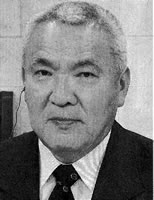English
ASIAN-PACIFIC MARITIME SECURITY AND THE U.S., CHINA AND JAPAN RELATIONSHIP FORUM
Establishing the Security of Free Maritime Activities
Riding a wave of remarkable economic growth and aiming at a rapid increase of its interests in Asian-Pacific waters, China is enhancing its naval presence. At the same time, Japan, the United States and the coastal nations of East Asia, seeing this as a threat to the safety and security of the same waters, have increased their sense of caution. The U.S., in a global realignment of its armaments, is reexamining its defense budget while at the same time China is in the midst of increasing the funding of its naval forces. In the foreseeable future, how will the balance of naval forces in East Asia change? Will maritime security be maintained?
We are pleased to welcome former commanders of the U.S. and Chinese navies as well as the Japan Maritime Self-Defense Force in a dialogue on each nation’s basic position and outlook for the future of the security of the seas of East Asia.
Participants
Moderator
Chairman, NPO Worldwide Support for Development (WSD)
Haruhisa Handa

Chairman of NPO Worldwide Support for Development (WSD)
Director of the Japan Forum on International Relations
Governor of Center for Strategic and International Studies (CSIS) Pacific Forum
Advisor to the Royal Government of Cambodia
Honorary Consul of the Kingdom of Cambodia in Fukuoka
Chairman of Board of Commentators, Southeast Asia Television
“A greater dialogue between Japan, the U.S. and China”
U.S. Navy Rear Admiral (Retired), Senior Fellow, CNA’s Center for Naval Analyses
Michael McDevitt

Senior Fellow, CNA’s Center for Naval Analyses
Navy Rear Admiral (Retired)
Held four at-sea commands, including an aircraft carrier battle group
Former Director of the East Asia Policy Office, United States Department of Defense CINCPAC (Commander‐in‐Chief, Pacific Command) Director for Strategy, War Plans, and Policy
Commandant of National War College
“Let’s build a practice of mutual cooperation”
Japan Maritime Self-Defense Force Vice Admiral (Retired)
Yoji Koda

Japan Maritime Self-Defense Force, Vice Admiral (Retired)
Former Commanding Officer, Destroyer Sawayuki
Chief of Staff, Fleet Escort Force
30th Commander, Fleet Escort Force
Commandant, Sasebo JMSDF District
36th Commander in Chief, Self-Defense Fleet
Since 2009, Harvard University, Asia Center, Senior Fellow
“Maintain a balance at sea”
People’s Liberation Army Navy Rear Admiral (Retired), PLA National Defense University Researcher
Yang Yi

PLA National Defense University Researcher
Rear Admiral (Retired)
Military Attaché to the Chinese Embassy in the United States
Director of the Institute for Strategic Studies, National Defense University, People’s Liberation Army (2010) currently, a researcher
National security, military strategy, and international policy expert
One of China’s most influential strategic thinkers
“Cooperate in a common partnership”
WSD-Handa Fellow, Center for Strategic and International Studies (CSIS)
Justin Goldman

Center for Strategic and International Studies (CSIS) WSD-Handa Fellow
Operated in Afghanistan and Pakistan with the 15th Marine Expeditionary Unit
West Africa Analyst
Research Fellow in Military Studies at S. Rajaratnam School of International Studies (RSIS) and instructor at the Singapore Armed Forces Training Institute and the Naval Advanced School
“Trust between navies through joint training”
The deepening East Asian maritime issue
Handa: In recent years, in places such as the South China Sea and East China Sea the actions of the Chinese Navy are becoming a threat to nations in the region. Firstly, from the perspective of the U.S. Navy, could you please tell us your basic thoughts?
McDevitt: Other than the issue of North Korea, all the remaining security issues in East Asia have a maritime dimension and are of a maritime and sovereignty related nature. It is my personal opinion that the most important issue for the United States and for our allied partners in the region is the changing balance in maritime power. As China’s defense capabilities increase and the line of defense moves further offshore, this needs to be balanced, and it is the United States’ responsibility to provide security to our allied partners that keeps pace with these changes. The best way to understand the relationship between allied partners is to divide up responsibilities. We call this “roles and missions” and the shorthand way to understand this is Japan provides the “shield” and the United States provides the “spear.”
Koda: I am very interested in the future of China’s maritime activities. Compared to the China of 20 years ago, China is most likely investing tens of times more in its navy and in 10 to 20 years will most probably maintain a considerably larger force. If this happens, the balance hitherto maintained will completely collapse.
Handa: When there is a clash of national interests, a fair dialogue cannot be conducted without a military balance. If the situation continues in this manner there is a possibility of a power reversal. Since 2008, there has been a concern that despite these changes in the situation of affairs, in Japan no progress has been made on a political or military response.
McDevitt: Last November, U.S. President Barack Obama announced a “pivot,” a military force rebalancing plan toward Asia. The planned rate of growth reductions in the defense budget will be applied to areas outside of Asia. However, there is a possibility that this will change depending on what happens in congressional politics and the presidential campaign.
Koda: The annual Japanese defense budget is $50 billion (¥4 trillion). On the other hand, the United States will reduce its military budget by $500 billion over the next 10 years and moreover Congress is calling for another similar reduction in the military budget. The problem is, amid these budgetary reductions, how will the U.S. and Japan maintain the balance of maritime force? The biggest problem is that there has been no specific discussion on a mutual reorganization and there is no mechanism of adjustment.
The strengthening Chinese Navy
Handa: Please tell us your thoughts on the Chinese Navy’s increasing naval power.
Yang: Maritime security is vital for China’s foreign trade-driven economic development. The enhancement of naval power is the exercise of the right to national self-defense. The Chinese Navy lags behind those of Japan and the United States, and perhaps due to this rapid growth is perceived as a threat. Our three nations have a common responsibility as major naval forces to build a cooperative relationship rather than a rivalry. I think the most important thing is not capability but intention, how you use your capabilities and influence.
Handa: I have also graduated from a Chinese university so I believe that I understand Chinese thinking. However, isn’t there quite a gap in relation to naval enhancement between the Chinese understanding and that of Japan and the West?
Yang: Inside China there exists a mountain of problems, and regarding China’s actions toward the East China Sea among other issues, the Chinese people see the government as being weak. This gap is unnaturally large. I think that through good communication with other nations the intention of each side becomes clearer and we can feel more comfortable.
Handa: In the same way that the government and the navy of China are obtaining the support of the Chinese people, isn’t there also a need for educational activities? For Japan, what is threatening about China?
Koda: China’s conduct at sea is felt to be overbearing by neighboring countries. In one sense, the intention changes overnight. The issue that Japan is most concerned about is that we don’t understand China’s vision for the future. Into the future, there is the need to build trust through dialogue.
A2/AD and ASB
Handa: The U.S. Navy has deployed the diplomatic strategy CARAT (Cooperation Afloat Readiness Training) to balance the actual capabilities, including the naval force of friendly nations, along the coast of the South China Sea.
McDevitt: CARAT has been effective, but with sovereignty disputes nationalism rears its head. If military force increases, there are changes in tension, and intentions may change. Therefore, the United States spends much time engaging Asian nations, building up the habit of cooperation and improving capacity building in relation to China.
Handa: Two key words regarding military security are A2/AD (Anti-Access/Area Denial) and ASB (Air-Sea Battle). A2/AD is a postulation concerning China’s defense strategy by a U.S.-centered maritime strategic group and ASB is a strategy combining the offensive capabilities of the air force and the navy to surmount A2/AD. What are your thoughts on this military power balance?
Koda: It may be surmised that in order to allow China to exert influence in Asia the A2/AD of the United States was created as a core security strategy. After World War II, the United States has effectively employed an air strategy. Hereafter, the key to maximizing U.S. capability is how well the world’s strongest air force and navy is utilized and this is one answer by the United States in regard to China’s A2/AD.
It is precisely trilateral cooperation that is mutually beneficial
Handa: How does China see the United States and how does the U.S. see China?
Yang: If these three countries were to fight each other, there would be no winner and we would all be losers. It is precisely our security relationships and cooperative relationships that are beneficial to all sides. China has strengthened its defense capabilities, but there is no intention to drive away the United States from the Western Pacific. We hope for positive and constructive actions: Japan and the United States accepting a strong China, and China responding with the correct actions appropriate for its increased military force. It is important to accept both these directions. In the long run I expect that there will be understanding based on our actions.
McDevitt: China has no intention of driving the United States out, but it is also a fact that China’s defense capabilities are improving. With an enhancement in military power could the intention change? Provisions for this eventuality are also necessary.
Goldman: I have experience serving as a marine in Iraq and Afghanistan. In recent years, the U.S. Defense Department has placed a greater emphasis on the value of preventative action. With ASEAN (Association of Southeast Asian Nations) partners, this emphasis is seen in the holding of multilateral gatherings. We think a slight contribution to prevention is worth a tremendous amount more than something that could bring war about. I think the U.S. role over multiple decades has helped to bring about a benign environment that has allowed phenomenal growth in Asia and it is incumbent on us to continue this role.
Handa: Those at the top of the navy seem to be truly amicable; however, one point is that there is not adequate dialogue between the navies of Japan and China. If an amicable dialogue eventuates, animosity will weaken, and this is a condition necessary to maintain security in the Pacific region.
Considering the Senkaku Islands issue
Handa: I think that in order for the Senkaku Islands issue to not be an exacerbated problem between China and Japan, efforts on both sides are required.
Koda: The official stance of the Japanese government is “regarding the Senkaku Islands, a territorial dispute between Japan and China does not exist.” On the other hand, it is also a fact that since the 1970s, China began to strongly claim sovereignty over the Senkaku Islands. What is difficult is that the friction between the world of the stated, public position and that of reality must be reconciled. The Japanese stance should not be changed, but what is important is preventing real friction from expanding into conflict through a multifaceted approach.
Handa: Beginning with the Law of the Sea, there are many undeveloped aspects of Japanese laws and international laws for the provision of border disputes.
Yang: The Chinese people do have a common understanding that the Diaoyu Islands (Senkaku Islands) belong to China, historically. However, presently our three nations are facing the difficulties such as economic recovery and it is not a time to problematize this issue. Diplomacy and peaceful negotiations are the only ways to resolve this issue and any military force is out of the question. This should not be used as a tactic by particular political figures.
McDevitt: The U.S. position consists of two points. Firstly, the Senkaku Islands are under the administrative control of Japan. The second point is that the United States officially takes no position either on the side of Japan or China. The answer is that we hope that wise national leaders manage and keep this issue under control.
For the safety of the Pacific region
Handa: There is a very large gap with our Japanese understanding that the Senkaku Islands are Japanese territory, but perhaps, if it was not for natural resources, there would be no Senkaku Islands issue. Finally, your opinions please.
Goldman: Regarding maritime issues, one role for the Marine Corps is training with our counterparts in the Self-Defense Force in the case of an emergency scenario developing in the Western Pacific, to prepare more promptly, and to cooperate in order to prevent action that may threaten. If China was to think of changing the status quo, this may have real value in terms of how it would impact on decision making in China. We need to find areas where we can cooperate, and areas where there is a lack of trust, and we need to think of ways of how to overcome these. There are some good trends out there, the growth of multilateral exercises involving many nations. China sometimes observes such exercises that the U.S. conducts even if they are not directly involved. At the end of the day, the sea has a natural way of uniting people and I think that might be our best hope.
Yang: This region is facing a time of profound change also in a geopolitical sense, and as the major players in the region, the United States, Japan and China should develop a cooperative partnership. It is cooperation that serves the interests of all people, and it is confrontation that torments all people.
Koda: On occasion there is a large gap between Chinese norms and what we over the years have built up to be the United Nations Convention on the Law of the Sea, and this leads to a double standard. Especially in relation to the application of international law, it is difficult to understand what China’s interpretation will be. Not only military budgets, but in terms of how China perceives the existence of and uses knowledge and technology, I think it is how you approach filling in the intent and other uncertain points.
McDevitt: The United States is committed to being an active player in East Asia. Our continued forward presence contributes to peace and stability and this results in economic growth, and economic growth is in the national interest of Japan, China and the United States. The best way to characterize our approach, at least with the U.S.-Japan alliance, is hope for the best and prepare for the worst.
Handa: The security of the Pacific region is actually directly related to what is already familiar to us. Through this discussion involving military experts, I think our understanding in relation to maritime security has deepened.
